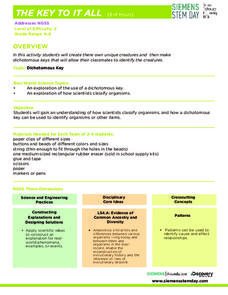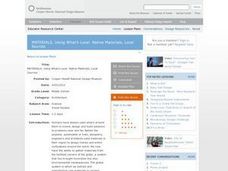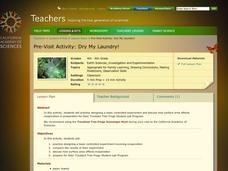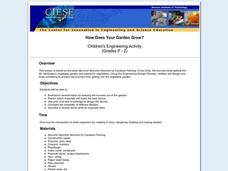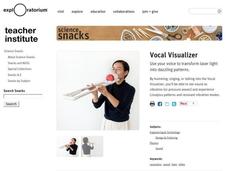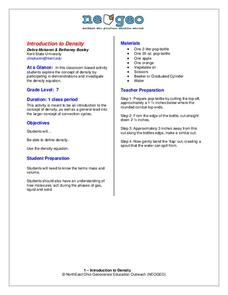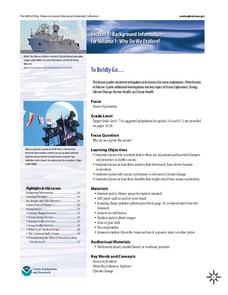Discovery Education
The Key to It All
Which characteristics make organisms unique? Dichotomous keys simplify the process of classifying organisms by focusing on these unique characteristics. Young scholars learn how to use the dichotomous key flow chart by creating their own...
DiscoverE
A Clever Way to Water
Your plants will survive without you. Scholars create a device that can water plants using a coiled string. Along the way, they learn about adhesion and cohesion of water. The challenge is to keep the plants alive for at least a week.
Science Friday
Make a Model Eardrum to Detect Sound Waves
Make sound waves visible with an experiment that asks middle schoolers to build a model ear drum using plastic bottles, rubber bands, plastic wrap, and sand-like substances.
Curated OER
MATERIALS, Using What’s Local: Native Materials, Local Sources
Young scholars consider the development of different societies. In this environmental building lesson, students consider local resources and how societies choose to use them. Young scholars use their findings to design a 'green' building...
LABScI
Projectiles: Target Practice
Angry Birds prepared them, but now pupils must prove their skills with projectiles! Scholars test different variables to determine which ones impact the distance the projectile flies. The experiment provides connections to kinetic and...
EduGAINs
Form and Function
Will that structure survive the force? The differentiated lesson allows pairs to choose the structure they would like to construct and the building materials they wish to use. Individuals record their findings in...
PBS
Helping Hand
Reach out and grab something. Given the task of picking up objects at least two feet away, pupils design and build a grabber. The last activity in a series of five challenges requires learners to use information about fulcrums and levers.
Curated OER
Go To Sleep, Gecko!
Second graders examine the interdependence of organisms using the book "Go To Sleep, Gecko!" They examine a variety of food chains, listen to the book, and answer story comprehension questions. Students then conduct research on food...
California Academy of Science
Dry My Laundry!
Meant to be a pre-field trip lesson, this can also serve as a cute and simple activity to use when your little ones are learning about evaporation or surface area. The children cut tiny t-shirts out of paper towel material, wet them, and...
Steven's Institute of Technology
How Does Your Garden Grow?
What to do, bunnies are getting into the garden and eating all the carrots! After reading the story Muncha! Muncha! Muncha! the class works together to design a device that will keep those bunnies out of the garden. They get together in...
Chymist
Make a Low Energy Radio Transmitter
How do you demonstrate radio transmissions? Pupils build a low-energy radio transmitter by constructing two coils from magnet wire and connecting them to audio/phone plugs. The resource provides the details on how to build the...
Exploratorium
Vocal Visualizer
Make sound visible with an activity that provides directions for how to build a vocal visualizer meant to create light patterns. Making noise into the visualizer causes a mirror to vibrate, reflecting a laser beam, and creating...
PHET
Soda Bottle Magnetometer
Introduce learners to set of complete instructions that describe how to build a magnetometer that works just like the ones professional photographers use to predict auroras. The diagrams are wonderfully descriptive, and the written...
PHET
Mapping the Field of a Dipole Magnet
High school scientists build their own magnetometer and use it to map the field surrounding a bar magnet. Excellent background resources is included, as well as a diagram of how to build the magnetometer.
Curated OER
Using Fulcrums
Students engage in a lesson plan that concentrates on the use of a lever and fulcrum. They define how a lever is used to lift a load. The lesson plan has background information to justify it. Students demonstrate how to use the lever...
NorthEast Ohio Geoscience Education Outreach
Introduction to Density
Seventh grade scientists weigh in on the concept of density. In a nutshell, they participate in the following activities:
Measurement of the mass and volume of fruit in order to compare densities
Measurement of the mass of oil and water...
Foundation for Water & Energy Education
How Can Work Be Done with Water Power? Activity B
In this second of three activities, energy engineers plan and create a hydropower dam as they learn how hydroelectric power plants generate electricity. A hydropower puzzle is also included, which can be worked on by teams that finish...
August House
Go to Sleep, Gecko
Use this multidisciplinary lesson to delve into these subjects: English language arts, math, science, drama, and character education. After reading, discussing, and making interpretations about Go To Sleep, Gecko!: A Balinese...
K-State Research and Extensions
Water
How are maps like fish? They both have scales. The chapter includes six different activities at three different levels. Scholars complete activities using natural resources, learn how to read a map, see how to make a compass rosette,...
PHET
Measuring the Interplanetary Magnetic Field
Scientists need to figure out how to measure interplanetary magnetic fields, but the magnetic field of the spacecraft is interfering with their readings. Scholars attempt to solve the problem that has perplexed NASA scientists for years.
NOAA
To Boldly Go...
When we think of ocean exploration, many of us have visions of sunken pirate ships full of treasure or mysterious creatures of the deep. What really motivates deep-sea investigation? The first in a series of diverse six-part lessons...
NASA
Newton Car
If a car gets heavier, it goes farther? By running an activity several times, teams experience Newton's Second Law of Motion. The teams vary the amount of weight they catapult off a wooden block car and record the distance the...
Discovery Education
Wind Power
How do engineers turn something that is readily available, like wind, into energy? Scholars create a prototype of a wind turbine and attach it to a motor. They test out their prototypes and decide on their effectiveness. They also...
Curated OER
"HOW I USE PLANTS" COLLAGE
Students create a collage that depicts the different ways they, as individuals, use plants. They describe ways in which humans use plants for food, shelter, and clothing and ways in which humans can protect natural areas to maintain...


